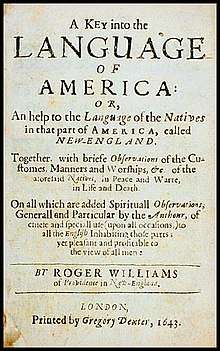A Key Into the Language of America

A Key into the Language of America (also known as A help to the Language of the Natives in that part of America called New England) is a book written by Roger Williams in 1643 describing the American Indian languages in New England in the 17th century, largely Narragansett, an Algonquian language.[1] The book is the first study of an Amerindian language in English.
History
Author Roger Williams was a Puritan who was banished from Massachusetts and founded Rhode Island. He believed that the king had no right to grant title to Indian lands without their permission. He interacted extensively with the Narragansett and Wampanoag tribes as a missionary, friend, and trader. He extolled many parts of Indian culture as superior to European culture, and he wrote a complementary poem at the end of each chapter within the book. According to J. Patrick Cesarini, Williams also published the book to rebut Massachusetts' distorted claims about the first Indian conversions to Christianity (particularly that of Wequash Cooke, a Pequot in Connecticut) and to thereby halt Massachusetts' moral claims to Rhode Island's territory.[2] Williams' friend Gregory Dexter printed the book in London, England, and the publication brought Williams much public attention.[3]
Notable words
The book helped to popularize and introduce numerous American Indian loan words into the English lexicon,[4] including:
References
- ↑ Williams, Roger (1827). A key into the language of America. Providence: John Miller. p. 110. Retrieved 2008-12-11. Reprint of a book first published in 1643.
- ↑ "The Ambivalent Uses of Roger Williams's "A Key into the Language of America"," by J. Patrick Cesarini, Early American Literature Vol. 38, No. 3, (© 2003 University of North Carolina Press), pp. 469-494 (accessed July 9, 2009 on JSTOR)
- ↑ O'Brien, Francis; Jennings, Julianne (2001). Introduction to the Narragansett Language: A Study of Roger Williams' A Key Into the Language of America. Aquidneck Indian Council.
- 1 2 3 Cutler, Charles L. (2000). O Brave New Words: Native American Loanwords in Current English. Norman, OK: University of Oklahoma Press. pp. 39–42. ISBN 978-0-8061-3246-4.
- ↑ Science, Volume 18, American Association for the Advancement of Science, Nov. 6, 1891, (Moses King, 1891) pg. 261 books.google.com
- ↑ John Pickering, A vocabulary or collection of words and phrases which have been supposed to be peculiar to the United States of America, "Squaw" (Pub. by Cummings and Hilliard, No. 1 Cornhill, 1816) pg. 180 books.google.com
- ↑ Allan A. Metcalf, The world in so many words: a country-by-country tour of words that have shaped our language (Houghton Mifflin Harcourt, 1999)
External links
- A key into the language of America by Roger Williams (Providence, 1936)
- "Narragansett Grammar"